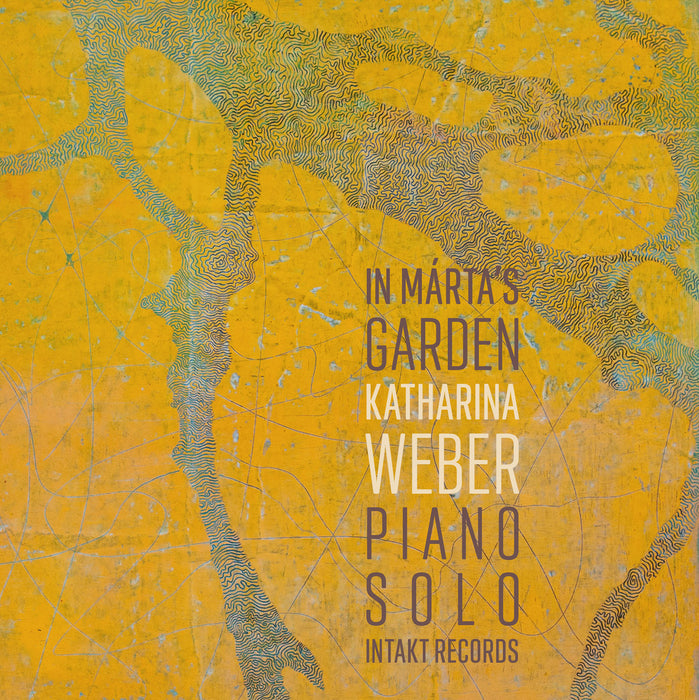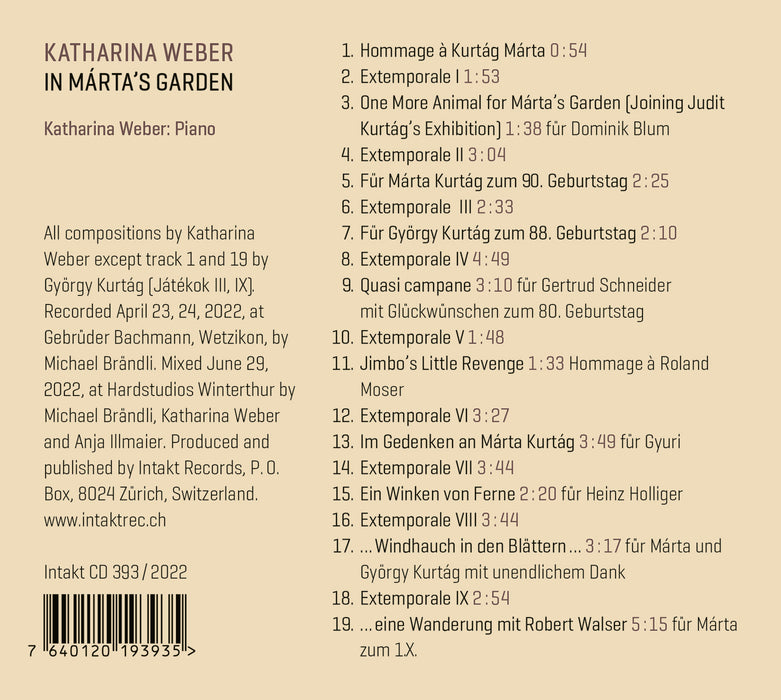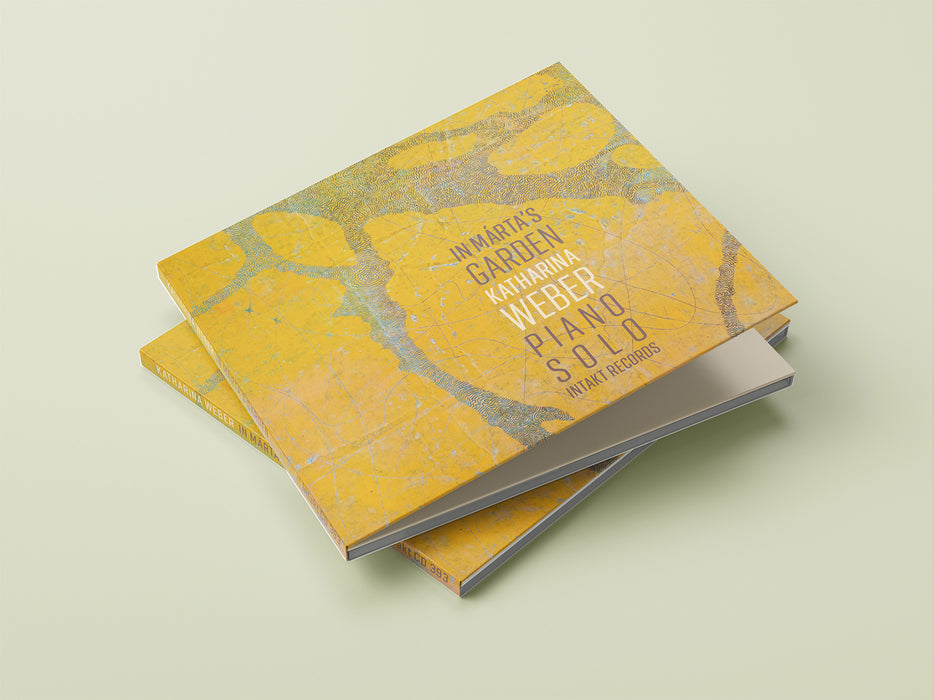


393: KATHARINA WEBER. In Márta’s Garden
Intakt Recording #393/ 2022
Katharina Weber: Piano
Recorded September 18, 19, 2022, at Hardstudios, Winterthur.
More Info
Fred Frith describes the Swiss pianist Katharina Weber as a “piano icon”. The classically trained pianist and composer moves in the large world of today‘s music, where borders no longer exist and new music and jazz improvisation merge. 12 years after her celebrated solo CD Woven Time. In Márta‘s Garden is her second solo album. The musical framework is formed by two piano pieces by György Kurtág dedicated to Márta Kurtág and at the centre is his composition “... eine Wanderung mit Robert Walser ...”. The exchange with the Kurtágs, which has now lasted three decades, has left intensive traces in Katharina Weber‘s work - as a performer, as an improviser and as a composer. “Tall grass, gently moved by the summer wind. An image that is always changing, moving in detail, only seemingly monochromatic. Like György Kurtág, Katharina Weber creates her own sound cosmos. Full of shimmering, delicate flowers, buzzing bees. Inspired by intimate listening in meditative contemplation, not shying away from tonality, but emphasising colour, tonal tensions and overtones – at the same time an invitation and space for deeper listening, pondering, spinning forth,” writes Nina Polaschegg in the liner notes.
Album Credits
Cover art: Christiane Lenz
Graphic design: Jonas Schoder
Liner notes: Nina Polaschegg
Photo: Palma Fiacco
All Compositions by Katharina Weber (an und für…) except track 1 and 19 by György Kurtág (Játékok III, IX). Recorded by Michael Brändli at Werkstatt Gebrüder Bachmann in Wetzikon on April, 23 and 24 2022. Mixed by Michael Brändli, Katharina Weber and Anja Illmaier on June 29 2022 at Hardstudios in Winterthur. Produced and published by Intakt Records, P.O.Box. 8024 Zürich, Switzerland.
Three recent releases feature veteran international pianists, one who is no longer with us and two others almost a generation apart. The one who has since passed happens to also be one of the all-time great jazz pianists: Frenchman Michel Petrucciani (1962-99) overcame a genetic disease (which greatly stunted his physical growth) and brittle bones to create rewarding music throughout his busy, if all-too-short life.
The Montreux Years (part of an extensive series that benefits the Claude Nobs Foundation) is a superb release consisting of previously unreleased performances by the pianist (from the Montreux Jazz Festivals of 1990, 1993, 1996 and 1998) and serves as a reminder of the major loss jazz suffered when Petrucciani died in 1999 at only 37 years of age. The pianist is heard in a variety of settings, starting with a real surprise: "35 Seconds of Music and More" features him with a boppish sextet (bassist Anthony Jackson, drummer Steve Gadd and three excellent horn players from France), an unusual setting for him. From the same date, performing in a trio with Jackson and Gadd, Petrucciani romps through the rhythm changes of "Little Peace in C for U", playing bebop at the highest level.
Two numbers (including a beautiful version of "Estate" that includes some stunning double time runs) have Petrucciani in a quartet with sweetening by Adam Holzman on synthesizer. There are three duets with bassist Miroslav Vitous: "Autumn Leaves", "So What" and a very effective uptempo version of "My Funny Valentine". A cooking "Summertime" has the pianist engaging in wondrous tradeoffs with organist Eddy Louiss. Petrucciani is also heard solo on "Take the 'A' Train" (which he takes apart) and a romantic version of his own "You Are My Waltz".
The other two releases are entirely solo efforts, starting with Mike Nock (who turns 83 this month). Nock left his native New Zealand to play music in Australia, and would spend 25 years based in New York, working with Yusef Lateef (1963-65) and leading the Fourth Way (1968-70). He has been back in Australia since 1985 and has at least 35 releases under his name, with Hearing being his first solo album in 30 years.
Performing 13 pieces (ten originals and three obscurities, including Bernie McGann's charming "Spirit Song"), Nock is in a consistently gentle mood, even when the performance is a free improvisation. Five of the selections are under two minutes in length, so he makes each moment count during this high-quality set of thoughtful and melodic mood music. Ranging from the playful "Conundrum" to a ballad for a fallen friend ("Vale John") to the attractively picturesque "Sunrise", Hearing serves as an excellent showcase for the pianist.
Swiss pianist Katharina Weber (65 this month) is an improviser and composer who additionally plays modern classical music. In Marta's Garden consists of brief sketches (only two of the 19 pieces exceed four minutes). It is the pianist's fourth album and second as a solo pianist for Intakt, and consists of 17 originals plus two by composer György Kurtág (with whom she studied in Hungary).
Weber's approach is closer to Ran Blake than to Cecil Taylor, in that she utilizes space and silence creatively, dramatically changing moods from piece to piece, which range from introspection or near-silence to moments of explosiveness. Her pieces are generally based on a single idea: variations on a phrase or, as on "Extemporale 1", something as simple as repeating one note. She often sounds as if she is thinking aloud at the piano, and her thoughts are never predictable, sometimes even jarring. In Marta's Garden will definitely keep listeners guessing.
For more info visit storyvillerecords.com, abc.net.au/abcmusic and intaktrec.ch
De komende tijd hier de nodige pianisten die het solo pad betreden, zowel binnen de jazz, als later binnen de hedendaags gecomponeerde muziek. Te beginnen met twee albums die de afgelopen maanden bij Intakt Records verschenen. Katharina Weber nam ‘In Márta’s Garden’ op en Marie Krüttli realiseerde ‘Transparence’.
De titel ‘In Márta’s Garden’ verwijst naar Márta Kurtág, de in 2019 overleden echtgenote van György Kurtág, maar ook zelf pianiste. Katharina Weber ontmoette het echtpaar dertig jaar geleden tijdens een masterclass. Een vriendschap ontstond die zijn sporen achter zou laten in het werk van Weber. De muziek van Weber heeft dan ook het één en ander gemeen met die van Kurtág. Allereerst zijn ook bij Weber de stukken kort, tot zeer kort, waardoor er negentien op dit album passen. Samengebalde energie ook hier en grote zeggingskracht en intensiteit met slechts weinig noten en vaak een ingenieus gebruik van stilte, bijvoorbeeld in ‘Für Márta Kurtág zum 90. Geburtstag’. Wat Weber ook gemeen heeft met Kurtág, aan wiens pianomuziek ik onlangs uitgebreid aandacht besteedde naar aanleiding van een festival in het Muziekgebouw aan ’t IJ, is het puntige karakter en de vaak sterk repetitieve insteek. Iets dat we mooi terugvinden in de delen ‘Extemporale’. Overigens horen we in deze stukken ook mooi terug hoe Weber hedendaags gecomponeerd combineert met geïmproviseerd. Weber voegde ook twee stukken van Kurtág toe aan het album, het eerste en het laatste, beiden uit ‘Játékok’. Een prachtig hommage dit album.
https://www.nieuwenoten.nl/katharina-weber-in-martas-garden-marie-kruttli-transparence-cd-recensie/
The Márta of the title of this solo piano album by many-faceted Swiss pianist, composer and teacher Katharina Weber (b. 1958) is Márta Kurtág (1927 -2019). Weber first got to know the Kurtágs in 1989, and stayed in dialogue with them for three decades. She has performed and taught their music extensively (two of her previous albums on Intakt include it), she visited them often in Hungary, and her own compositional practice has been influenced and mentored by them. This solo piano album both starts and finishes with a piece by György Kurtág from the collection Játékok (games) in each case the piece is specifically dedicated by him to his wife Márta.
Katharina Weber is at the confluence of so many different streams of music. She has worked with Fred Frith, who has called her a “piano icon”, and is often to be found in the company of free improvisers such as Swiss saxophonist Christian Kobi. But she is also at the heart of the Swiss contemporary classical composition stream, and has dedicated pieces on the album to composer/performers such as Gertrud Schneider and Heinz Holliger. Her Beethoven 250 Commission from the SUISA Foundation was about Beethoven’s “6 Variations on a Swiss song” from 1790... as seen through the prism of John Cage. And the label she records for, the always impressive and thoughtful Intakt, is probably best known for its jazz recordings, notably those of another, very different Swiss pianist Irene Schweizer.
Perhaps it is in contrast to Schweizer that Katharina Weber’s own character comes through most clearly. With Schweizer you don't have to read far before the word "fireworks" crops up yet again. Weber is nothing like that. She works with uncrowded textures, indeed her economy of expression throughout this disc is very affecting. “Monastic” is a word that has been used to describe her art. The compositions, improvisations and explorations on In Márta’s Garden stay with miniature forms, and yet there is a constantly vivid and eternally curious imagination at work here, and also a clear preoccupation with structure and form. One of the most compelling pieces is half way through, “Quasi Campane” (Like Bells) which is a wonderful and unhurried exploration of the natural resonances of the piano, a fine Bösendorfer, superbly recorded. Quiet, contemplative, and recommended. - Sebastian Scotney
https://theartsdesk.com/classical-music/classical-cds-canons-castles-and-converted-chapel
Geen enkele solo-performer werkt in een vacuüm. Voor de ene is dat een impliciet aanwezige gedachte, voor de andere iets om expliciet mee aan de **** te gaan. Dat laatste geldt voor pianist Katharina Weber, die vaak in dialoog gaat met György Kurtág, de Hongaarse componist, pianist en lesgever, een dominante invloed in haar oeuvre. Ook deze keer is de aanwezigheid van Kurtág en diens overleden partner Márta doorgesijpeld op alle niveaus. Twee van diens miniaturen fungeren als voor- en achterkaft voor Webers korte composities die duidelijk verwijzen naar de componist, terwijl de improvisaties waar ze haasje-over mee doen gelden als meta-reflecties. De composities zijn gecondenseerde statements, de vrije stukken drukker, minder rigide. Weber denkt zelf aan poëzie versus proza. In Márta's Garden is een boeiend programma dat kamermuziek en improvisatie bedachtzaam in elkaar laat overlopen.
Das ungarische Musiker- und Komponisten-Ehepaar Márta und György Kurtág wird von vielen verehrt, etwa, um nur einige zu nennen, von Heinz Holliger, Balts Nill oder Barry Guy. Und von der klassisch ausgebildeten Zürcher Pianistin Katharina Weber, die sich aber auch mühelos in der improvisierten Musik bewegen kann. Dieses Album ist dem Ehepaar Kurtág gewidmet, enthält zwei Klavierstücke von ihm, die er für seine Frau komponiert hat, und acht Klavierstücke von Weber. Sie sind den Kurtágs und Musikern und Musikerinnen aus Webers Umfeld gewidmet. Dazwischen sind neun Improvisationen, von ihr als "Extemporale" bezeichnet, eingestreut. Dieser Musik-Garten, in den Weber einlädt, ist vielfältig. In ihm spriessen viele Blumen, übersetzt in Stimmungen oder Bilder wie dunkel, ****, dräuend, lieblich, meditativ, innerlich und manchmal, wenn die Pianistin in Klanggewitter übergeht, fast beunruhigend. Schön dann die innige Wiedergabe von György Kurtags Komposition " eine Wanderung mit Robert Walser". Sie bildet den Abschluss dieser Einladung, sich in diesem musikalisch wundersamen Garten, in dem viele Töne wie ein Windhauch verklingen, umzuhören.
Márta, von deren Garten die CD handelt, ist Márta Kurtág. Mit ihr und ihren Mann György hatte die Schweizer Pianistin und Komponistin Katharina Weber im Jahr 1989 eine Begegnung, aus der eine lebenslange Freundschaft und musikalische Beziehung entstand. Jetzt hat Weber bei Intakt eine Solo-CD herausgebracht, die an diese Begegnung erinnert, auch als Widmung an die 2019 hochbetagt Verstorbene gedacht. Auf den 19 Miniaturen hat Weber zahlreiche Widmungen untergebracht, nicht nur an die Kurtágs, sondern auch an Roland Moser, Gertrud Schneider oder Heinz Holliger. „Einzelne, ruhig und zart, dennoch klar und pointiert angeschlagene Töne. Ausklingen lassend. Dynamisch abgestuft, aufeinander bezogen. Akkorde. Ruhig. Mit Bedacht. Nachhorchend“, schreibt Kollegin Nina Polaschegg im Booklet. Zweifellos, aber auch aufbrausend, abwechslungsreich, zwischen festgeschriebenen Kompositionen und Improvisationen changierend. Jedes zweite Stück ist eine Impro, Extemporale genannt, auch als Rückmeldung an die davorstehende kleine Komposition. Knapp hingeworfen, mit leichter Hand intoniert. Die perfekte Balance von Dissonanzen und Tonalität, von klanglicher Irritation und makelloser Schönheit, von intellektueller Herausforderung und emotionaler Tiefe kennzeichnen ein Meisterwerk.
Già protagonista di un tributo al compositore ungherese (Games And Improvisation. Hommages à György Kurtág, Intakt 2012), complici Barry Guy e Balts Nill, poi in combutta, sempre per la label di Zurigo, con Fred Frith e il compianto Fredy Studer (It Rolls, 2015), prima ospite dell'ex Henry Cow e dell'ARTE Quartett in "The Big Picture" del 2009, la pianista bernese classe 1958 Katharina Weber dedica questo lavoro nitido e austero a Màrta, la moglie dell'autore magiaro, che ha avuto modo di incontrare nelle sue ripetute visite a casa Kurtág per prendere lezioni dal Maestro. Brevi, austere miniature, distillate fino ad una scabra, prosaica essenza, che l'autrice paragona alla poesia, raccolte assieme a improvvisazioni più ampie, attraversate da lampi lenti e sottile che a tratti si accendono di vampe corrusche. Erba alta, leggermente mossa da un vento estivo. Composizioni che ad ogni ascolto svelano altri, seducenti enigmi. Tra la musica da camera e l'improvvisazione più (s) ragionata: un disco luminoso, capace di sprigionare tutta la sua potenza sottovoce.
Katharina Weber hat eine Soloklavier-CD vorgelegt, die sich elegant und überzeugend zwischen vermeintlich definierten Welten bewegt. Beim ersten Hören gewinnt man den Eindruck, dass es sich um zeitgenössische Klaviermusik aus dem Klassik- bzw. E-Bereich (>>E< und >>U<< sind nicht mehr sonderlich angesehen in der Musikwelt) handelt, um Miniaturen, die einzelne Aspekte (Intervalle, Tonwiederholungen, Klangfelder, Akkordschichtungen u.ä.) musikalischen Denkens in den Fokus nehmen. Ja, die Rede ist von Konstruktion, Bauen, Zusammenfügen, abgeleitet vom Verb >>componere<<, das sich im Hauptwort >>Komposition<<<< versteckt. Doch folgt bei Weber auf jedes notierte Stück Musik ein improvisiertes, gleichsam eine Art >>Nachsinnen über<< das Vorangegangene, streng jenes, freier und freigiebiger dieses. An diesem Punkt kommt wenn man so will der Jazz zu seinem Recht.
Gewidmet hat Weber >>In Márta's Garden<< dem Ehepaar Márta und György Kurtág, sie Pianistin und Klavierpartnerin ihres Mannes, er der neben György Ligeti und Péter Eötvös wohl bedeutendste Komponist Ungarns nach 1945. Deren gemeinsames Album »Játékok<<< (Spiele) für Klavier zu zwei und vier Händen, ein >>work in progress<<, das erstmals 1997 bei ECM erschienen ist, bildet die Blaupause für Webers musikalische Reflexionen, ja sie eröff-net ihre Sammlung von insge-samt 19 Stücken sogar mit >>Hommage à Kurtág Márta«, Track 28 der »Játékok<<-CD. Was als Gesamteindruck hängen bleibt, sind die Vielzahl musikalischer Ideen, die wohltuende Abwechslung von Dichte und Weite, von Aktivem und Kontemplativem, ist die Kurzweil von Webers musikalischen Ideen.
Wat „namedropping“ om de soloplaat van pianiste Katharina Weber te situeren: Fred Frith (een groot bewonderaar van haar) en György Kurtág (naar wie ze hier enkele keren rechtstreeks verwijst en van wie ze twee nummers interpreteert). De cd-titel refereert bovendien naar deze laatste zijn vrouw, Márta. Weber was persoonlijk bevriend met het koppel. Negentien miniatuurtjes die in lengte variëren van net geen minuut tot vijf minuten.
Allemaal heel fragiel en sober opgebouwd rond korte en langere stiltes verweven in de Bermuda-driehoek van partituur, improvisatie en tijd. Ook wel te omschrijven als een intieme luisterervaring bij het doorbladeren van een dagboek.
https://www.jazzhalo.be/reviews/cdlpk7-reviews/various/vier-maal-solo-2/?fbclid=IwAR28O17d5RGVDcPGGUgsj2BTw7fPnHQJaAqlbJ6magrRf2Hyzs4ovnpttyM
L’idéal serait d’oublier que Katharina Weber, pianiste impliquée dans les répertoires classiques et contemporains s’adonne très souvent aux joies de l’improvisation aux côtés de Fred Frith notamment. Il faudrait aussi oublier qu’elle a jadis étudiée la composition auprès de György Kurtag et est devenue l’amie de son épouse, la pianiste Marta Kurtag.
Parions donc que les détentes et cascades de cet enregistrement ne sont pas le fruit du hasard mais une porte d’entrée dans un univers où s’attirent les contraires. A une résonnance molle répondra plus tard quelques chevauchées instables. Dans cette sphère ou se contient le temps et où se resserre le cosmos, Katharina Weber plonge (toujours) dans la résonnance, la réverbération, la densité des essences. Essences rares puisées dans le jardin de la regrettée Marta.
https://www.jazzin.fr/sur-six-solos-absolus/
